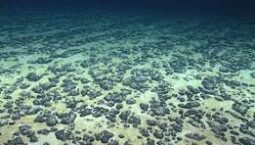Siirry offline-tilaan Player FM avulla!
Deep-sea Coral Reefs // Mineral-Mining
Manage episode 403479077 series 49299
This week’s How On Earth offers two features:

photo credit: NOAA
Deep-sea coral reef discovery (start time: 0:58) Scientists recently discovered and mapped the largest known deep-sea coral reef in the world. It’s located up to 200 miles off the U.S. Atlantic Coast, and it’s larger than Vermont. The news comes as a bright spot for oceans and marine life, when ocean acidification related to global warming, as well as overfishing, have been destroying coral reefs around the world. Contributing host Kara Fox interviews Kasey Cantwell, the operations chief for the Expeditions and Exploration Division of the National Oceanic and Atmospheric Administration, about the big discovery and its implications.

photo credit: NOAA
Deep-sea mining: promises and perils (start time: 10:48) Exploratory mining of the ocean floor for minerals began decades ago. Although commercialization remains elusive, some some companies are moving rapidly to exploit the seabed for commercial use. They aim to harness critical minerals – manganese, nickel, copper, cobalt and others – for use in the production of electric vehicle batteries, cell phones, wind turbines, etc. Some scientists, environmentalists, a regulatory body, and even some auto and tech companies, have called for at least a temporary ban on seabed mining, out of concern about its impact on marine life. Host Kara Fox interviews Farah Obaidullah, founder of the conservation group The Ocean and Us, and editor of a book of the same name, about seabed mining.
Hosts/Producers: Kara Fox, Susan Moran
Engineer: Sam Fuqua
Executive Producer: Joel Parker
Listen to the show here:
684 jaksoa
Manage episode 403479077 series 49299
This week’s How On Earth offers two features:

photo credit: NOAA
Deep-sea coral reef discovery (start time: 0:58) Scientists recently discovered and mapped the largest known deep-sea coral reef in the world. It’s located up to 200 miles off the U.S. Atlantic Coast, and it’s larger than Vermont. The news comes as a bright spot for oceans and marine life, when ocean acidification related to global warming, as well as overfishing, have been destroying coral reefs around the world. Contributing host Kara Fox interviews Kasey Cantwell, the operations chief for the Expeditions and Exploration Division of the National Oceanic and Atmospheric Administration, about the big discovery and its implications.

photo credit: NOAA
Deep-sea mining: promises and perils (start time: 10:48) Exploratory mining of the ocean floor for minerals began decades ago. Although commercialization remains elusive, some some companies are moving rapidly to exploit the seabed for commercial use. They aim to harness critical minerals – manganese, nickel, copper, cobalt and others – for use in the production of electric vehicle batteries, cell phones, wind turbines, etc. Some scientists, environmentalists, a regulatory body, and even some auto and tech companies, have called for at least a temporary ban on seabed mining, out of concern about its impact on marine life. Host Kara Fox interviews Farah Obaidullah, founder of the conservation group The Ocean and Us, and editor of a book of the same name, about seabed mining.
Hosts/Producers: Kara Fox, Susan Moran
Engineer: Sam Fuqua
Executive Producer: Joel Parker
Listen to the show here:
684 jaksoa
Semua episod
×Tervetuloa Player FM:n!
Player FM skannaa verkkoa löytääkseen korkealaatuisia podcasteja, joista voit nauttia juuri nyt. Se on paras podcast-sovellus ja toimii Androidilla, iPhonela, ja verkossa. Rekisteröidy sykronoidaksesi tilaukset laitteiden välillä.




